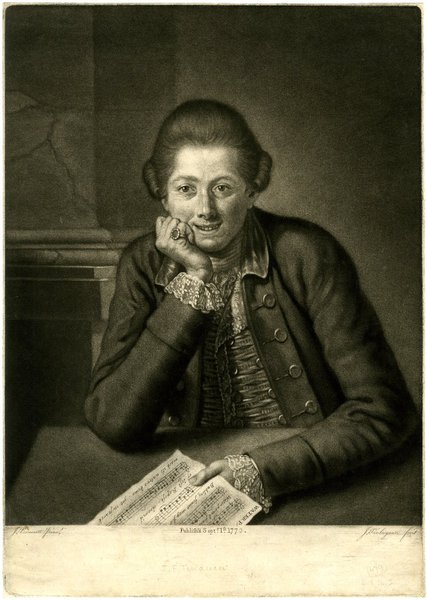Commentary
(pdf)Elizabeth Harris, née Clarke (1722–1781), was the wife of James Harris (1709–1780), a native of Salisbury and nephew of the eminent philosopher Anthony Ashley-Cooper, 3rd Earl of Shaftesbury. James himself was a scholar and writer, and throughout his life an ardent amateur musician and director of musical events, who attended concerts and operas as often as he could (see Burrows & Dunhill 2002, introduction). From 1761 he was Member of Parliament for Christchurch, and he and Elizabeth spent significant portions of each year in London. The lines above are entries in Elizabeth’s London account book, showing her purchases of tickets for musical and theatrical events in Apr and May 1765.
Among these are tickets for a benefit concert given by the Mozarts; this can only have been the concert that eventually took place in Hickford’s Great Room on 13 May 1765, their last such concert in England. Leopold had first announced the intended concert on 11 Mar 1765 in The Public Advertiser, without giving a location or an exact date (“at the End of this Month, or the Beginning of April next”). The concert was advertised again on 9 Apr 1765, now at “the End of this Month”, still without a location (Dokumente, 44). The earliest known advertisement to include the actual date, 13 May, was published in The Public Advertiser on 1 May, the day after Elizabeth Harris’s entry in her account book.

Advertisement for the Mozarts’ concert on 13 May 1765
The Public Advertiser, Wed, 1 May 1765, [1]
(newspapers.com)
The location of the concert is not yet specified; it was finally announced on 10 May that it would take place in Hickford’s Great Room (Dokumente, 44). Thus Elizabeth Harris purchased tickets for the Mozarts’ concert of 13 May before the date and location had been advertised. However, she may have been able to learn at least the date from some other source.
The advertised price for a single ticket to the Mozarts’ concert was 5 shillings, but the amount recorded in Elizabeth Harris’s account book is 10s 6d, equivalent to half a guinea, sixpence in excess of the price of two tickets. The reason for the discrepancy is unknown, but the Mozarts’ advertisement gives 10s 6d as the price of Wolfgang’s sonatas dedicated to Queen Charlotte (op. 3, K. 10–15), so perhaps this has something to do with it. Or perhaps she simply paid with a half guinea coin, and did not take change.
In other entries from around this time, she records buying tickets for two benefits given by the castrato Giusto Fernando Tenducci. On 28 Mar 1765, five days before the first entry transcribed above, Tenducci had given a performance for his own benefit of the pasticcio Antigono, and this is probably the performance her entry refers to.

Advertisement for Tenducci’s benefit performance of Antigono
The Public Advertiser, Thu, 28 Mar 1765, [1]
(newspapers.com)
The entry in Harris’s account book shows that she paid £2 2s for four tickets to the benefit. The amount, 42 shillings, was exactly two guineas; this is consistent with Tenducci’s advertisement, which states that tickets for the pit and boxes cost half a guinea each.
Under the date 30 Apr, Harris records spending one pound on “Tickets for Tendduci”. These tickets would have been for the castrato’s benefit performance at Covent Garden the following day of Thomas Arne’s Artaxerxes.

Advertisement for Tenducci’s benefit performance of Artaxerxes
The Public Advertiser, Wed, 1 May 1765, [1]
(newspapers.com)
The ticket price is not given in this advertisement or in previous ones for the same event, but one pound would have purchased four box tickets at 5s each (Burrows & Dunhill 2002, 443).

Tenducci (1770), mezzotint by John Finlayson after an original by J. Bruscett.
Tenducci is holding a vocal part for “Water Parted from the Sea,” from Thomas Arne’s Artaxerxes.
(British Museum)
Harris’s entry for the “Foundling Hospital” refers to the annual performance of Handel’s Messiah on 2 Apr 1765 to raise money for that institution. Harris purchased one ticket for a half guinea (10s 6d).

Advertisement for the benefit performance of Messiah for the Foundling Hospital
The Public Advertiser, Tue, 2 Apr 1765, [3]
(newspapers.com)
Her entry for “Merifield” refers to John Merrifield, a dancer at Covent Garden. The event was a benefit performance at Covent Garden on 20 May of Beggar’s Opera (Burrows & Dunhill 2002, 443).

Advertisement for the benefit performance of Beggar’s Opera at Covent Garden
The Public Advertiser, Mon, 20 May 1765, [1]
(newspapers.com)
Elizabeth Harris’s ticket for the Mozarts’ benefit concert is the only known reference to them in the papers of the Harris family, and we have no verification that she or her husband actually attended the concert. It may be that for all their love of music, they had relatively little interest in the prodigies from Salzburg.
